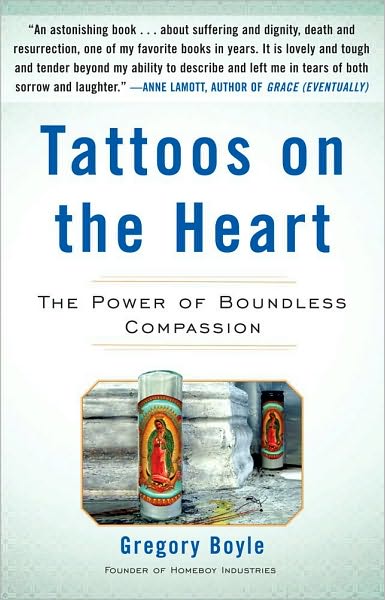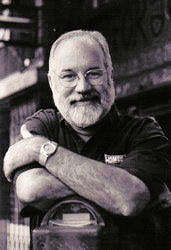 A homily is defined as “a sermon, especially one intended to edify a congregation on a practical matter and not intended to be a theological discourse” or “a sermon that is usually on a Biblical topic and usually of a nondoctrinal nature.” Tattoos on the Heart: The Power of Boundless Compassion is a homily, delivered eloquently, simply, and powerfully by Father Gregory Boyle, pastor of Dolores Mission, situated in the Boyle Heights neighborhood of Los Angeles. Boyle Heights has the highest concentration of deadly gang activity and Dolores Mission is the poorest congregation in the Los Angeles archdiocese. The statistics on California gangs are beyond staggering. In Los Angeles alone, there are 1,100 different gangs comprised of 86,000 members.
A homily is defined as “a sermon, especially one intended to edify a congregation on a practical matter and not intended to be a theological discourse” or “a sermon that is usually on a Biblical topic and usually of a nondoctrinal nature.” Tattoos on the Heart: The Power of Boundless Compassion is a homily, delivered eloquently, simply, and powerfully by Father Gregory Boyle, pastor of Dolores Mission, situated in the Boyle Heights neighborhood of Los Angeles. Boyle Heights has the highest concentration of deadly gang activity and Dolores Mission is the poorest congregation in the Los Angeles archdiocese. The statistics on California gangs are beyond staggering. In Los Angeles alone, there are 1,100 different gangs comprised of 86,000 members.
Since he began serving Dolores Mission in 1984, Father Boyle has stood over 168 caskets bearing (mostly) young victims of senseless gang violence. And yet, Tattoos on the Heart is ultimately a homily filled with a message of hope. For atheists and even many agnostics, that may seem impossible. There may even be those among the fellowship of believers in a higher power, regardless of the name ascribed to that being, for whom Father Boyle’s commitment to his parish and community, and perseverance in the face of so many heart-breaking losses, is unfathomable.
 Tattoos on the Heart is not an easy book to read for the simple fact that a good number of the “homies” with whom Father Boyle has interacted over the years have led unspeakably difficult, often tragic, lives. But the tales of gang members finding self-respect, a sense of belonging and purpose, and a promising future for their own children are also uplifting and told with an infectiously joyous spirit. A few are also as hilarious as they are poignant, such as the story of Joey, a former gang member who confided in Father Boyle that he had found a job at Chuck E. Cheese.
Tattoos on the Heart is not an easy book to read for the simple fact that a good number of the “homies” with whom Father Boyle has interacted over the years have led unspeakably difficult, often tragic, lives. But the tales of gang members finding self-respect, a sense of belonging and purpose, and a promising future for their own children are also uplifting and told with an infectiously joyous spirit. A few are also as hilarious as they are poignant, such as the story of Joey, a former gang member who confided in Father Boyle that he had found a job at Chuck E. Cheese.
“Well . . . that’s great, son,” I assure him, feeling my nose grow. “But what do you do there?”
“But that’s the thing. Gee, you can’t tell the homies.”
I nod.
“I’m the rat.”
The mascot, a rat, IS Chuck E. Cheese.
“Wow . . . I mean that’s great.” I try and convince him . . . and myself.
Joey complains that the costume is hot and the kids, with their pushing and tugging, bug him. But when Father Boyle continues probing into Joey’s motivation to work, “Joey gets sober and clear-eyed, and there is no doubting, for him, how he was led to this moment and place and rat suit. ‘In two months, my son’s gonna be born. I want him to come into the world and meet his father — a workin’ man.'”
I wonder what happened to Joey, and his son, as well as all the other folks’ whose life experiences — and the lessons they provide — are related in a series of chapters devoted to themes such as “Compassion,” “Slow Work,” “Gladness,” “Success,” and, lastly, “Kinship.” In particular, I wonder about the lives impacted and transformed by their intersections with Father Boyle’s constituents. For instance, since reading Tattoos on the Heart, I have found myself pondering the fate of a particular nurse. As she wheeled the lifeless body of Manny, gunned down by a rival gang member on a freeway onramp, to the operating room where his organs would be harvested and given to donors, she turned to the nurse accompanying her and shook her head in disgust as she gazed at Manny’s tattoos.
“I mean,” she says, rolling her eyes, “who would want this monster’s heart?” The other nurse stops the gurney midhallway and turns on her coworker with a clarity that may well have surprised herself. “How dare you call this kid a monster? Didn’t you see his family, his friends, his son? He was nineteen years old, for God’s sakes. He belonged to somebody. Shame on you.”
Compassion is not a relationship between the healer and the wounded. It’s a covenant between equals. … Compassion is always, at its most authentic, about a shift from the cramped world of self-preoccupation into a more expansive place of fellowship, of true kinship.
~~Father Gregory Boyle
Ultimately, Father Boyle’s message is that we all belong: To ourselves, the one who created us, each other. We are all equal and we are all deserving of compassionate care within a community — a kinship.
Tattoos on the Heart is not a book that can be read in one sitting, not because it is hard to remain focused and interested in the subject matter, and not because of Father Boyle’s writing style. He writes, in fact, in a crisp, engaging, conversational style, as though he were delivering this homily from the front of the sanctuary to an enthralled congregation. Rather, Tattoos on the Heart evokes an intense emotional reaction that demands periodic respites. It is also, however, not a book to be read just once. It is the type of volume that you will want to return to over time for inspiration and reflection.
And for encouragement, when needed, just as Anthony did. Anthony wanted to be an auto mechanic, but had no training or skills. So Father Boyle paid a visit to his own mechanic, Dennis, and asked him to give Anthony a job because he was “eager, and I think he could learn stuff.” As Father Boyle stuttered through a litany of unconvincing reasons why Dennis should give Anthony a break, Dennis stared at him, puffing his cigarette. Finally, completely spent, Father Boyle decided to “give up and shut up.” At that moment, Dennis calmly looked at the priest and said, “I will teach him everything I know.” So, as Father Boyle sums it up succinctly, “Anthony became a mechanic.” Later, Anthony showed Father Boyle a photo of himself and Dennis with their arms around each other, grease on Anthony’s face, and his trademark cigarette hanging from Dennis’ mouth. Not only did the picture reveal that Anthony was “a transformed man.” It also demonstrated conclusively that Dennis was “an equally changed human being” because he opted to be “in the world who God is.”
Tattoos on the Heart is written from a spiritual perspective, but not preachy. Plainly, if Father Boyle is interested in making disciples, it is only through his own example of how bestowing compassion upon others can effect change from the inside out. There is no fire and brimstone to be had in this sermon. On the contrary, this sermon derives purely from New Testament (new covenant) lessons. Tattoos on the Heart is Father Boyle’s quietly affecting, loving witness to the myriad ways in which being a faithful servant has enriched his own beliefs and strengthened his resolve to continue serving with the fervent hope that he does not find himself standing before any more caskets bearing the bodies of young men and women who have been felled on the gang-controlled streets of Los Angeles.
Father Boyle founded Homeboy Industries. It has served members of more than half of the gangs in Los Angeles. Homeboy Industries’ various businesses include baking, silkscreening, an landscaping. Gang affiliations are left outside as young people work together, side by side, learning the mutual respect that comes from building something together. 100% of the profits from sales of Tattoos on the Heart: The Power of Boundless Compassion go directly to Homeboy Industries.



3 Comments
[New Post] Book Review: Tattoos on the Heart https://www.jhsiess.com/2010/07/22/book-r…
Thank you for the great review of this book, I rarely read book reviews but am on the hunt for a new pile of books to devour and this one looks to be one that needs to be near the top of the pile. Thank you again!
Pingback: Saturday Review of Books: July 31, 2010 | Semicolon